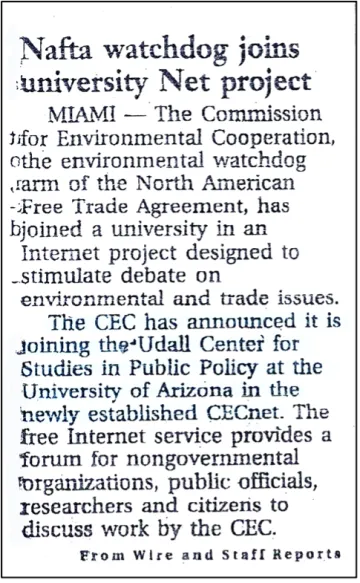More than a Quarter-Century of Udall Center Involvement in US-Mexico Border Environmental Governance

Almost since its 1987 creation, the Udall Center has played an important role in US-Mexico transboundary water governance.
The Center’s involvement began in September 1989, when then-Director Helen Ingram and then-Associate Director Robert Varady obtained the first of what would be 11 grants over a ten-year period from the Ford Foundation to study bilateral issues, policies, and strategies for crossborder water resources management.
As preparations for the North American Free Trade Agreement (NAFTA) were heating up in the early 1990s, the Udall Center staked out a prominent position as advocates for a sustainable, bottom-up, transparent—in short, democratic—approach to border water governance that featured public participation.
Working with an expert group of like-minded scholars and environmental NGO representatives, in 1993 the Center coauthored a widely-distributed white paper that proposed an international border environmental commission—a prototype of what the following year became the trinational (Canada, Mexico, and US) Commission for Environmental Cooperation (CEC) and the binational (Mexico and US) Border Environment Cooperation Commission (BECC) and its partner, the North American Development Bank (NADBank).
Soon after NAFTA was enacted and adopted in January 1994, the Udall Center secured another multiyear grant from the Charles Stewart Mott Foundation, “Democratic Institutions, BECC, and Environmental Sustainability in the Border Region.”

Journal of Commerce 1997
One of the lasting impacts of that award was the establishment of two pioneering discussion groups designed to promote public discourse on the workings of the new post-NAFTA institutions. Put in place at a time when Internet use was in its relative nascency, the first of these, BECCnet, was created by the Center in early 1995, and the second, CECnet, the following year.
The two venues provided an open space for NGOs, public officials, researchers, and citizens to discuss the work of the new institutions. A quarter century later, both channels survive and have long served as quasi-official discussion platforms for NADBank (which united with and absorbed BECC in 2017) and CEC. The Udall Center continues to host both listservs and remains heavily involved in border environmental governance, with special emphasis on green infrastructure and a continuing focus on the role of the public.
Those early grants and the activities they spawned were instrumental in bringing significant public attention to the Udall Center and placing it squarely in the applied public policy arena.
Find directions on how to subscribe to the BECCnet and CECnet listservs here.

